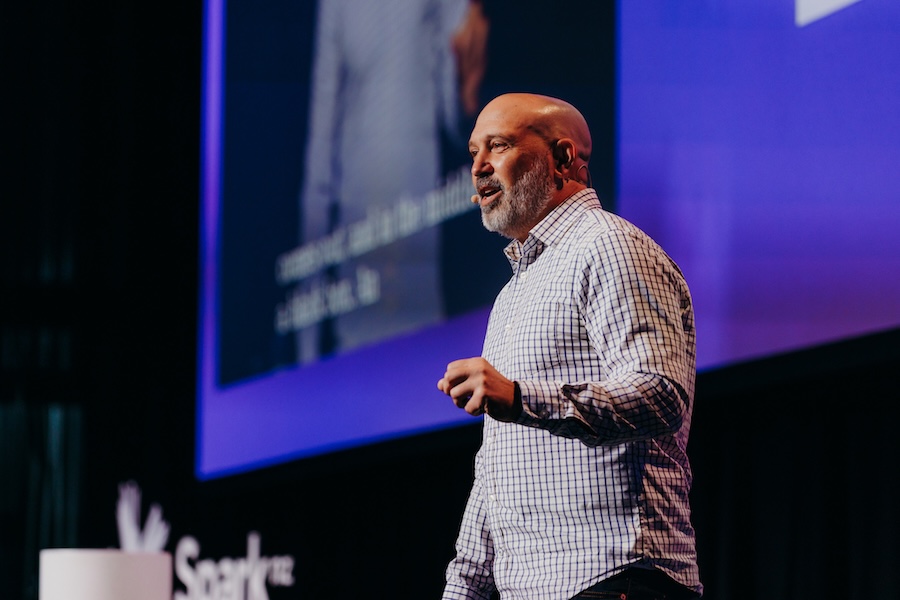Empowering New Zealand SMEs to embrace the AI revolution
Pictured above: Edmundo Ortega.
Discover how Spark’s AI Foundations course is equipping New Zealand’s SMEs with the tools and confidence to embrace artificial intelligence, transforming productivity and competitiveness in an increasingly digital world.
Artificial Intelligence (AI) has transitioned from a futuristic novelty to an indispensable tool for businesses worldwide. However, despite its growing importance, many SMEs in New Zealand remain hesitant to adopt AI. According to a Spark New Zealand and NZIER survey, 68 percent of New Zealand SMEs have no plans to evaluate or invest in AI, citing a lack of understanding and perceived absence of value.
To bridge this gap, Spark partnered with Section, a New York-based business school, to create the AI Foundations course, aimed at equipping business professionals with foundational AI skills.
As editor of NZBusiness magazine and a participant in the course, I had a firsthand look at how the programme empowers SMEs. Coupled with insights from Edmundo Ortega, a leading AI consultant and one of the course instructors, it became clear that AI literacy is no longer optional – it’s essential for Kiwi businesses to stay competitive.
The week-long AI Foundations course was meticulously designed for accessibility, making AI concepts approachable for participants regardless of their technical expertise. The course covered practical tools and techniques, from crafting effective AI prompts to using AI for workflow improvements and task automation.
One of the programme’s standout features was its hands-on approach. Participants were encouraged to experiment with consumer AI tools such as ChatGPT and DALL·E, immediately applying what they learned to real-world business scenarios. For SMEs, where resources are often stretched thin, this focus on practicality and quick wins was particularly valuable.
Throughout the course, Edmundo repeatedly emphasised how SMEs are uniquely positioned to benefit from AI adoption. Smaller businesses, he explained, often lack the bureaucratic inertia that slows larger organisations.
“In smaller teams, decision-making is faster, and there’s less resistance to change. This agility is key when adopting transformative technologies like AI,” Edmundo said during a conversation I had with him on the sidelines of the course.
For SMEs, Edmundo argued, AI is not about implementing grand, costly solutions but rather identifying specific, impactful use cases. For example, a consultancy firm could use AI to analyse client data more efficiently, while a construction company might employ AI-powered tools to streamline project management.
“Just start using the tools,” he said. “The more you explore, the more you’ll uncover opportunities specific to your business.”
One of the course’s key objectives was to dispel misconceptions about AI. Many businesses still view AI as a complex and inaccessible technology reserved for tech giants. Ortega’s teaching challenged this narrative, presenting AI as a tool that anyone can learn to use effectively with a little guidance.
“Understanding and using AI is no longer optional – it is essential for businesses that want to get ahead. The key is to start small. Experiment with basic tools, learn what they can do, and gradually scale up from there.”
He also addressed common concerns about AI, such as data privacy and potential misuse. While these challenges are real, Edmundo explained that they are manageable with proper training and awareness.
In our discussion Edmundo also highlighted the importance of cultural relevance when implementing AI in New Zealand. As a bicultural nation, New Zealand has unique challenges and opportunities in integrating AI. For instance, tools that incorporate Te Reo Māori and reflect Māori cultural values could play a crucial role in making AI adoption more inclusive and relevant.
“There’s no technical reason why an AI tool couldn’t be fine-tuned for New Zealand’s unique cultural context. It’s a matter of prioritising and investing in such projects to ensure AI reflects and preserves local norms and values.”
This vision aligns with Spark’s broader goal of bringing New Zealand businesses one technology generation forward.
Edmundo also shared insights from his global experience in AI consulting, painting a clear picture of what AI adoption could mean for New Zealand SMEs. Here are some of the key takeaways:
1. AI as a productivity tool
Edmundo framed AI as a productivity enhancer rather than a replacement for human labour. He cited numerous examples where AI could save time and resources for SMEs, such as automating repetitive tasks, improving customer service, and generating insights from data. “Think of AI as a lubricant for your business processes. It can smooth out inefficiencies and free up your team to focus on higher-value activities.”
2. The importance of training
He was emphatic about the need for structured training programmes like AI Foundations. While self-learning can work for some, formal training ensures that teams have a solid understanding of AI principles and can apply them effectively. “The more training you have, the better you’ll be at identifying use cases that actually move the needle for your business,” Edmundo said.
3. AI’s paradigm shift
Edmundo stressed that AI represents a fundamental shift in how businesses operate. Unlike traditional software development, AI enables businesses to rethink workflows entirely, focusing on outcomes rather than processes. “With AI, it’s not about automating what you already do – it’s about reimagining how you could do things better.”
4. Challenges and cautions
While he’s optimistic about AI’s potential, Edmundo also urged caution. For small businesses, the lack of internal checks and balances can sometimes lead to poor implementation. Misunderstandings about data privacy, unrealistic expectations, and improper use of AI tools are common pitfalls. “The biggest mistakes often stem from not understanding the limitations of the tools. A little training goes a long way in avoiding these issues.”
New Zealand faces persistent productivity challenges, ranking low among OECD nations. Ortega believes AI can play a pivotal role in addressing this issue, particularly for SMEs. However, he acknowledges that the journey begins with small steps.
“Once you see what AI can do, the opportunities start to unfold,” he said. “The key is to start experimenting, find one or two use cases, and build from there.”
Practical examples from the course included:
- Using ChatGPT to draft professional emails and summarise reports.
- Employing AI-powered tools to analyse customer feedback and identify trends.
- Leveraging generative AI for creative tasks, such as designing marketing materials.
For many participants, these use cases were eye-openers, demonstrating how AI could deliver tangible benefits even with minimal investment.
Spark had positioned the AI Foundations course as more than just an educational programme, but rather a call to action for New Zealand businesses. “You don’t have to be an expert in AI, but you do need to start. The earlier you begin, the sooner you’ll discover how AI can transform your business,” said Edmundo.
For New Zealand’s SMEs, the AI revolution is not just about keeping pace with global trends – it’s about staying competitive in an increasingly digital world. Whether you’re a small consultancy, a retail business, or a construction firm, the message is clear: AI is here, and it’s time to embrace its potential.
By investing in training, exploring use cases, and fostering a culture of innovation, New Zealand businesses can unlock new levels of productivity and creativity. As Spark’s initiative shows, the tools and resources are readily available. The only question is: will you take the first step?
For those ready to embark on this journey, the AI Foundations course is an excellent starting point. With experts like Edmundo Ortega – and a raft of local experts and organisations – guiding the way, Kiwi businesses have everything they need to navigate the AI landscape confidently.
This article was originally published in the December 2024 issue of NZBusiness magazine. To read the issue, click here.





